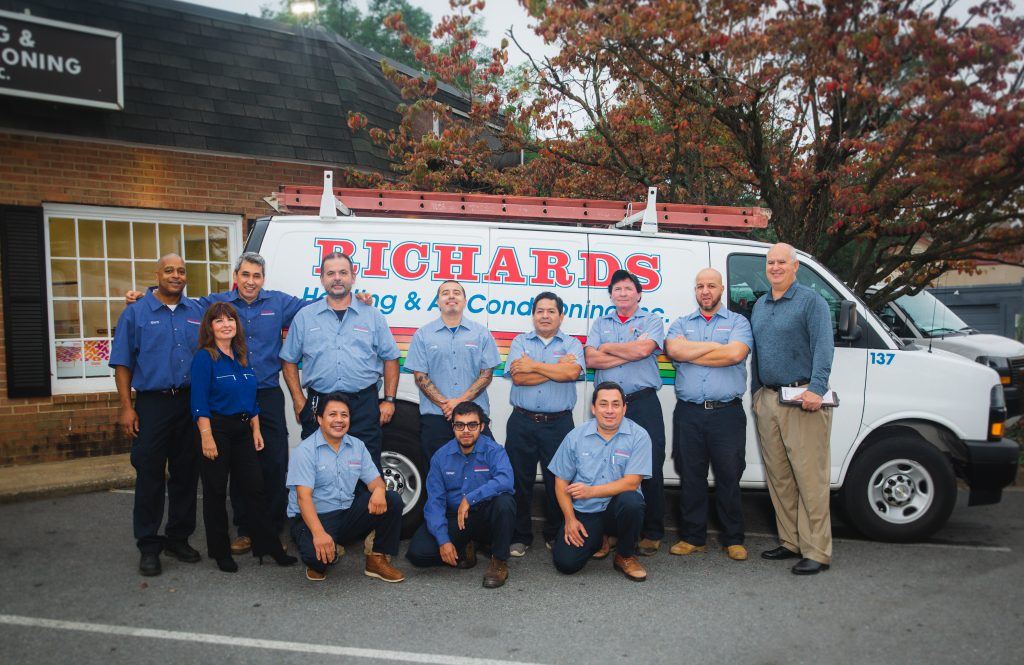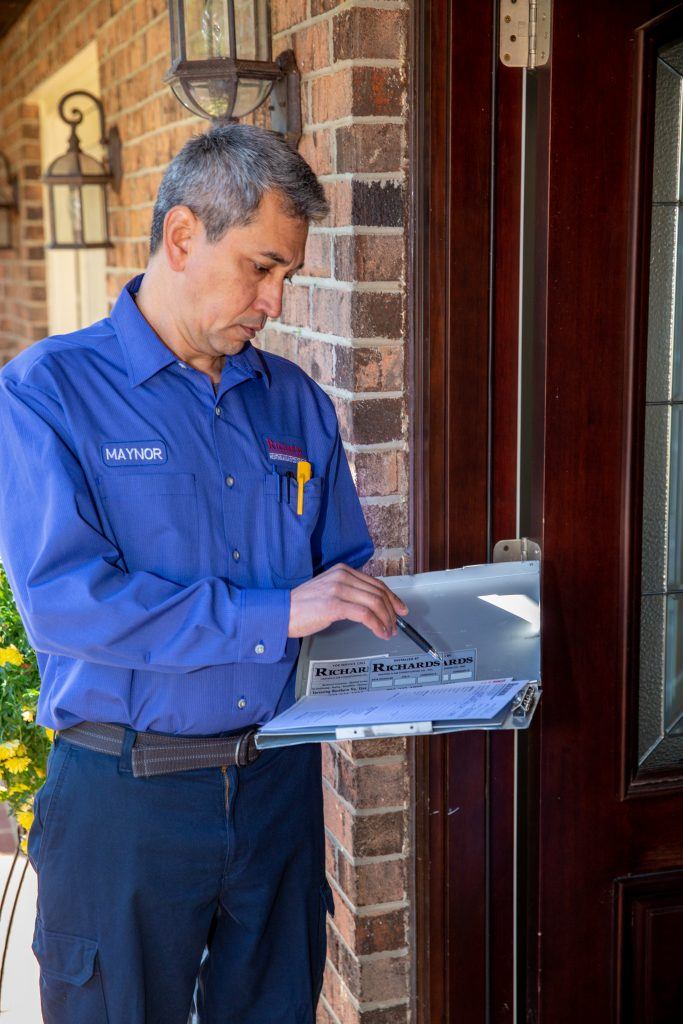Understanding When Your Water Heater Needs Replacement in Bethesda
Water heaters are essential components of every home’s comfort system, working silently behind the scenes until something goes wrong. At Richard's Heating & Air Conditioning Co., Inc., we recognize that determining when to replace your water heater can be challenging for homeowners in Bethesda, MD. Since 1959, our team has been designing, installing and servicing residential systems throughout the Washington Metropolitan area, and we’ve seen firsthand how proper timing of water heater replacement can save homeowners from unexpected cold showers and costly water damage.
The average water heater lifespan ranges from eight to twelve years, depending on water quality, usage patterns, and maintenance history. If your unit approaches this age range, you should start monitoring its performance closely. Signs of deterioration include rusty water, strange noises emanating from the tank, inconsistent water temperatures, and visible moisture around the base of the unit. These symptoms often indicate internal corrosion or sediment buildup that compromises efficiency and reliability. When multiple issues appear simultaneously, replacement becomes more cost-effective than repeated repairs.
Types of Water Heaters Available for Bethesda Homes
Modern water heating technology offers several options that can significantly improve your home’s energy efficiency and hot water availability. Traditional tank water heaters remain popular due to their lower upfront costs and straightforward installation process. These units store between forty and eighty gallons of heated water, maintaining consistent temperature through periodic heating cycles. Electric models work well in homes without natural gas access, while gas-fired units typically offer lower operating costs in areas where natural gas is available.
Tankless water heaters have gained substantial market share in recent years, particularly in upscale neighborhoods throughout Bethesda. These compact units heat water on demand, eliminating standby energy losses associated with traditional tanks. Although initial installation costs exceed those of conventional models, tankless systems can reduce water heating expenses by twenty to thirty percent annually. Heat pump water heaters represent another energy-efficient option, extracting warmth from ambient air to heat water while simultaneously providing minor cooling benefits to surrounding spaces. As a fully licensed and insured mechanical, gas fitting, and electrical contractor, we help homeowners evaluate which technology best suits their specific needs and budget constraints.
Professional Installation Process and Requirements
Water heater replacement involves multiple technical considerations that extend beyond simply swapping old equipment for new. Proper sizing calculations account for household size, simultaneous hot water demands, and recovery rate requirements. Undersized units struggle to meet demand during peak usage periods, while oversized models waste energy maintaining unnecessary water volumes. Our experienced technicians perform detailed load calculations to recommend systems that fit each customer’s needs, ensuring optimal performance without excess capacity.
Installation requirements vary significantly based on chosen technology and existing infrastructure. Gas water heaters require proper venting to safely exhaust combustion gases, with different models demanding specific vent pipe materials and configurations. Electric units need adequate electrical service capacity, potentially requiring panel upgrades or dedicated circuit installation. Local building codes in Montgomery County mandate specific safety features including temperature and pressure relief valves, thermal expansion tanks, and drain pans with proper drainage connections. Permit requirements ensure installations meet current safety standards, protecting homeowners from liability issues and ensuring insurance coverage remains valid.
Energy Efficiency Considerations and Cost Savings
Energy efficiency ratings significantly impact long-term operating costs for water heating systems. The Energy Factor rating measures overall efficiency by comparing energy delivered as hot water versus total energy consumed. Higher ratings translate directly into lower utility bills, with modern high-efficiency units achieving ratings above 0.95 compared to older models operating below 0.60. Federal standards have progressively increased minimum efficiency requirements, making even basic replacement units substantially more efficient than systems installed fifteen years ago.
Financial incentives can offset upgrade costs for qualifying high-efficiency installations. Federal tax credits, utility rebates, and state programs provide substantial savings opportunities for homeowners investing in energy-efficient equipment. Heat pump water heaters and solar-assisted systems often qualify for maximum incentive amounts, potentially reducing net installation costs by several thousand dollars. We assist customers in identifying applicable programs and completing required documentation to secure available incentives.
Maintenance Requirements and Warranty Protection
Professional installation establishes the foundation for reliable water heater operation, but ongoing maintenance determines actual equipment lifespan and performance consistency. Annual maintenance tasks help prevent premature failure and maintain warranty coverage:
- Anode rod inspection: checking sacrificial components that protect tank walls from corrosion
- Sediment flushing: removing mineral deposits that reduce heating efficiency and capacity
- Temperature and pressure valve testing: verifying safety systems function properly
- Combustion analysis: optimizing gas burner performance for maximum efficiency
- Electrical connection inspection: identifying potential failure points before problems develop
Manufacturer warranties typically cover tanks for six to twelve years against leaks, with additional coverage for components like heating elements and thermostats. Extended warranty programs provide additional protection beyond standard coverage periods, offering peace of mind for homeowners concerned about unexpected replacement costs. We recommend reviewing warranty terms carefully, as coverage often requires professional installation and documented annual maintenance.
Planning Your Water Heater Replacement Project
Successful water heater replacement requires careful planning to minimize disruption and ensure seamless transition to new equipment. Emergency replacements following sudden failures create stress and limit equipment options, often resulting in hasty decisions and suboptimal outcomes. Proactive replacement before complete failure allows thorough evaluation of available options, scheduling installation at convenient times, and potentially taking advantage of seasonal promotions or manufacturer rebates.
At Richard's Heating & Air Conditioning Co., Inc., we are proud of our work and dedicated to maintaining a reputation in the industry and the community as reliable experts. Our comprehensive approach includes initial assessment, equipment recommendations based on specific household requirements, detailed cost estimates including available incentives, and professional installation with proper permitting and inspection coordination. Post-installation support ensures customers understand operation procedures and maintenance requirements, maximizing their investment value. Whether you need immediate replacement due to equipment failure or want to upgrade aging equipment before problems arise, our team provides expert guidance throughout the entire process, ensuring your Bethesda home maintains reliable hot water service for years ahead. Contact us today.







